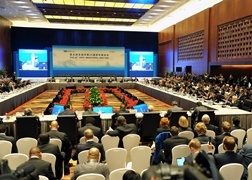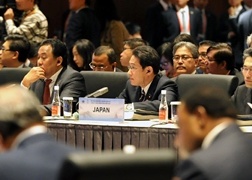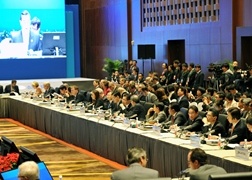Asia-Pacific Economic Cooperation (APEC)
2014 APEC Ministerial Meeting in Beijing



On November 7 and 8, the Asia-Pacific Economic Cooperation (APEC) Ministerial Meeting (chaired by Mr. Wang Yi, Foreign Minister of the People’s Republic of China, and Mr. Gao Hucheng, Minister of Commerce of the People’s Republic of China) was held in Beijing, the People’s Republic of China, and foreign ministers and ministers responsible for trade from 21 countries and regions participated in the meeting (Mr. Fumio Kishida, Minister for Foreign Affairs, and Mr. Yoichi Miyazawa, Minister of Economy, Trade and Industry, attended the meeting from Japan). Under the theme of the 2014 Beijing APEC “Shaping the Future through Asia-Pacific Partnership,” the participants exchanged opinions on a wide range of fields such as “Advancing regional economic integration,” “Promoting innovative development, economic reform and growth,” and “Strengthening comprehensive connectivity and infrastructure development.” As a result of the meeting, a “Joint Ministerial Statement (see gist[PDF] / English
/ English )” was released. An overview of the discussion is as follows:
)” was released. An overview of the discussion is as follows:
1. Results of 25 years of APEC and future roles
- (1) In terms of the results of 25 years of APEC, each economy appreciated the fact that APEC has achieved higher economic growth than any other region in the world and has consistently supported multilateral trade system on the basis of the Bogor Goals that aims to realize free and open trade and investment by year 2020.
- (2) Concerning the future of APEC, there was an opinion that regional economic integration and economic development should be sought on the basis of mutual cooperation and trust while taking the degree of development of each economy into consideration.
- (3) An outline of statements by representatives from Japan is as follows:
- A. Appreciated 25 years of APEC for its promotion of regional economic integration and support of multilateral trading system.
- B. In terms of the expected future roles of APEC, (i) to continue leading approaches such as the reduction of tariffs on environmental goods , (ii) to strengthen cooperation with the business community as APEC that emphasizes “open regional cooperation,” and (iii) to ceaselessly improve stable business environments based on rules, were pointed out.
2. Strengthening comprehensive connectivity and infrastructure development
- (1) The “APEC Connectivity Blueprint” was endorsed. Importance of public-private partnership (PPP) concerning infrastructure development was stressed. An agreement to extend the validity of the APEC Business Travel Card (ABTC) to five years was welcomed. Importance of educational exchanges that contribute to mutual understanding and regional connectivity within the region was also confirmed.
- (2) An outline of statements by representatives from Japan is as follows:
- A. Promotion of PPP as a response to significant demand for infrastructure within the region is important.
- B. For the promotion of investment for infrastructure development, it would be important to: (i) consider the “quality of infrastructure” such as lifecycle cost, environmental impacts and safty (refer to the “Guidebook on Quality of Infrastructure Development and Investment” compiled by Japan), and (ii) lead such investment to the creation of jobs for local residents and their capacity building while securing high-quality standards such as consideration on environmental society and transparency.
3. Cooperation in the fields of sustainable development, disaster risk reduction, and women and economy
- (1) Continuation of cooperation in fields such as energy, the environment, disaster risk reduction, women’s economic participation , construction of a sustainable health system, and anti-corruption was confirmed.
- (2) Representatives from Japan stressed the importance of resilient regional connectivity and construction of a value chain on the basis of its experience in the Great East Japan Earthquake. In addition, they also called for participation and cooperation from leaders/ministerial-level officials for the third UN World Conference on Disaster Risk Reduction to be held in March next year. Moreover, they introduced Japan’s efforts in the APEC for promotion of women’s participation into society ((i) efforts for increasing the ratio of female managerial officials, and (ii) a report on “Leading Companies for Women in APEC”).
4. Support of multilateral trading system
- (1) Discussions were held on implementation of the Bali agreement and how to end a stalemate of the negotiation functions of the World Trade Organization (WTO). Importance of (plurilateral) efforts by willing countries such as expansion of the Information Technology Agreement (ITA) in the multilateral trading system was recognized. Extension of the deadline of the standstill commitment to 2018 and reconfirmation of roll back protectionist were suggested to the leaders.
- (2) Representatives from Japan stated that (i) they would be committed to finding a solution to regain negotiation functions of the WTO, (ii) the earliest possible conclusion of the ITA expansion negotiations would be enhanced and in terms of the negotiations on environmental goods, abolition of tariffs on a wider range of goods should be aimed at, and (iii) the deadline of the standstill commitment should be extended to 2018 and roll back protectionist should be reconfirmed.
5. Progress of regional economic integration
- (1) “The Beijing Roadmap for APEC’s Contribution to the Realization of the FTAAP” was endorsed , the “collective strategic study on issues related to the realization of the FTAAP” was agreed on, and results of the study would be reported to ministers by the end of 2016. Moreover, the “APEC Strategic Blueprint for Promoting Global Value Chain Development and Cooperation” was endorsed.
- (2) An outline of statements by representatives from Japan is as follows:
- A. The FTAAP should be realized on the basis of the success of TPP, RCEP and the Japan-China-ROK FTA and Japan would be proactively involved in these negotiations to enhance its efforts for the roadmap.
- B. For the realization of the FTAAP, liberalization and facilitation of service trades are crucial. Japan would coordinate with the Philippines for the establishment of the action plan next year.
- C. As a crystallization of the “APEC Strategic Blueprint for Promoting Global Value Chain Development and Cooperation,” Japan would lead two efforts - resilience and improvement of investment environment.
6. Promoting innovative development, economic reform and growth
- (1) Participants recognized that innovative growth through economic reform is their common issue for APEC to be the growth engine of the world. “APEC Accord on Innovative Development, Economic Reform and Growth.” was endorsed.
- (2) An outline of statements by representatives from Japan is as follows:
- A. Japan would strongly promote Abenomics. Japan would also steadily implement its growth strategies to enhance its efforts and cooperation that contribute to further development of APEC.
- B. For the improvement of energy security, clean energy such as high efficient coal-fired power plantsand nuclear power plants as a basic power source, renewable energy, improvement of energy efficiency, and competitive and flexible LNG market by relaxing destination clauses are key issues.


 (Open a New Window)
(Open a New Window)